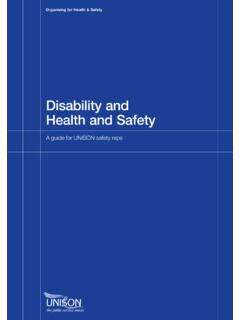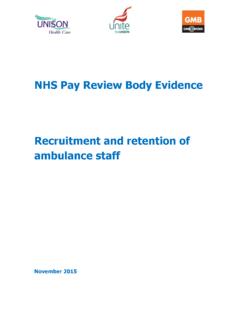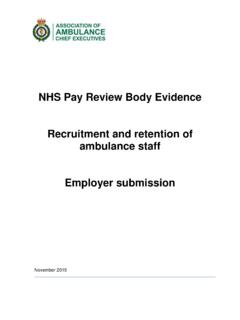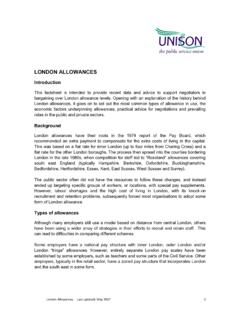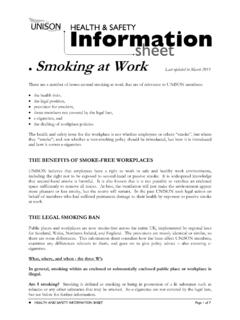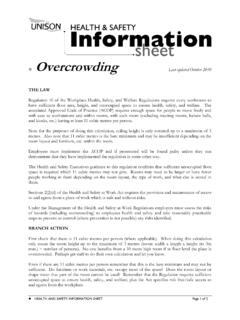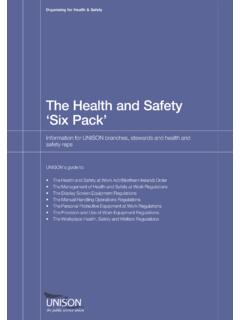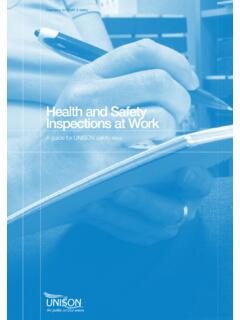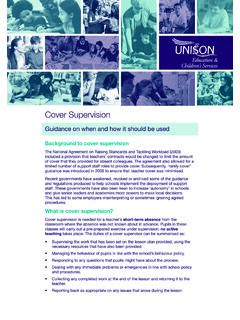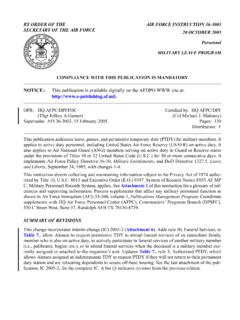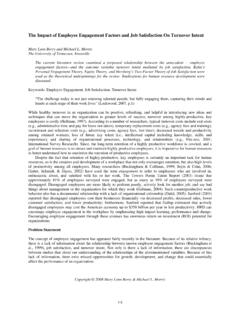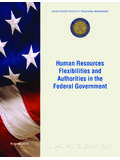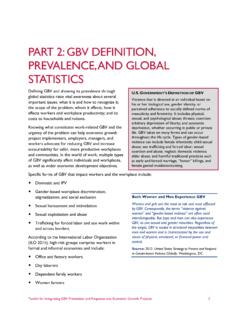Transcription of COMPASSIONATE LEAVE (OR TIME OFF FOR DEPENDANTS) …
1 COMPASSIONATE LEAVE / Time off for dependants Last updated: April / 20161 COMPASSIONATE LEAVE (OR TIME OFF FOR DEPENDANTS) GUIDEI ntroductionThis guide outlines the basic statutory entitlements to take COMPASSIONATE LEAVE (or time offfor dependants) provided by legislation Section 57 (A) of the Employment Rights Act 1996. Itthen goes on to highlight key bargaining issues for seeking improvements on the minimumentitlements and provide benchmark rates as reference points for Statutory Entitlements Time off for dependants As an employee you are allowed time off to deal with an emergency involving adependant; A dependant could be a spouse, partner, child, grandchild, parent or someone whodepends on you for care; You are allowed a reasonable amount of time to deal with an emergency, but thereis no set amount of time as it depends on the situation ACAS guidancesuggeststhat the time off allowable is normally a day or two.
2 Your employer may pay you for time off to look after dependants but they don t haveto. There is no statutory entitlement to pay if you do take time off for an emergency; Your right to take time off to look after a dependant is a day one employment right; The Equality Act 2010 protects employees with protected characteristics andtherefore employers must make sure that they treat all requests for LEAVE equally andthat they do not treat employees less favourably than that qualify for time off?An emergency is defined in the government advice by the following examples you couldget time off when a dependant is involved in the following emergencies: Illness, injury or assault (of a dependant) This includes mental or physical illnessesand it does not need to be life threatening.
3 It could be that they have an existinghealth condition that has got worse. You can also take time off to arrange longerterm care for a dependant; The death of a dependant (see COMPASSIONATE LEAVE below); The failure of a normal carer to turn up for work; An incident with your child at school; Dependant is having a baby - you can also take time off if a dependant goes intolabour if you are the person they are relying on to take them to hospital if you arethe child s parent you can take time off after the birth as you will be entitled toCompassionate LEAVE / Time off for dependants Last updated: April / 20162paternity or maternity information on working parents terms andconditions can be found in that don t qualify for time off?
4 Examples of where you do not qualify for time off include: Your employer may give you time off to deal with an emergency but they do not haveto give you time off to deal with home emergencies including fire, flooding, burglaryor broken boiler; Your employer does not have to give you time off for taking dependants to a plannedmedical appointment; Your employer does not have to give you time off for dealing with a pet emergency ortaking a pet to the vet; Your employer does not have to give you time off for dealing with a personal crisis(relationship breakdown). COMPASSIONATE LeaveCompassionate LEAVE may be granted to an employee if they experience the bereavement ofa dependant. The right to time off to deal with an emergency or COMPASSIONATE LEAVE is a day one employment right; although an employer does not have to pay an employee forany LEAVE taken.
5 Although there is no legal right to be paid, some employers may offercontractual right to pay under an employee s terms and conditions of off for dependants Case LawNaisbett v Npower LtdThe employment tribunal found that a mother s six absences totalling seven days in 12 monthsconstituted reasonable under of the Employment Relations Act Naisbett had a three year old child who was attending nursery at the time of this claim. MsNaisbett was the main carer and due to the commitments of other family members she was theonly person able to look after her child when the child was ill and unable to attend Naisbett brought a tribunal claim against her employer alleging she had suffered a detrimentwhen exercising her right to take time off for dependants.
6 Her employer had placed Ms Naisbetton their formal capability procedure for non-medical absence after Ms Naisbett had taken sixabsences totalling seven days in a period of 12 employment tribunal ruled in Ms Naisbett s favour and awarded 1,000 for the ruling highlights lack of case law in this area but employers need to decide what a reasonable amount of time is in each individual circumstance and decide what is a genuine unforeseen : Xpert HR Feb 2013 COMPASSIONATE LEAVE / Time off for dependants Last updated: April / 20163 Employers may define COMPASSIONATE LEAVE as time off for an emergency or time off fordependants, as some employers may view this LEAVE as the same thing.
7 However someemployers will have negotiated a separate COMPASSIONATE / bereavement LEAVE policy whichmay entitle employees to be is also important to note that as part of the statutory legislations, female employees whosuffer a stillbirth after 24 weeks are entitled to up to 52 weeks statutory maternity leaveand/or areportby the National Council for Palliative Care, National Bereavement Alliance andDying Matters1, an overwhelming 87% of British adults surveyed agreed that employersshould have a COMPASSIONATE LEAVE policy, four in five people (81%) agreed there should bea legal right to receive paid bereavement LEAVE when someone close to them (child, parentor partner) has just half of the respondents they interviewed (56%) said they would consider leaving theirjob if their employer did not provide proper support if someone close to them died andalmost a third of people who had been bereaved in the last five years said they were nottreated compassionately by their guidance onManaging Bereavement in the Workplacesets out good practise andpractical advice for employers when dealing with employees that have suffered thebereavement of a close family member.
8 The guide explains the legal aspects and rights ofemployees to apply for COMPASSIONATE LEAVE in these situations, returning to work after abereavement, the health and safety implications in the workplace, culture and diversityissues as well as important information on how the Equality Act can protect employees whoexperience depression, anxiety or post-traumatic stress disorder following a guidance also contains a model bereavement policy that UNISON branches can use asa template if they are in discussions with their employer about adopting a local conducted by the Chartered Institute of Personnel and Development (CIPD) andcited in the ACAS guidance suggests that most employees are given five days paid LEAVE todeal with emergencies ( COMPASSIONATE LEAVE ).
9 Many employers in the public and privatesector have separate bereavement LEAVE policies and procedures, which are separate fromtime off for After Death Six steps to improve support in bereavement - ComRes data - Jan 2014 SOAS has negotiated a Bereavement LEAVE Policy and Procedure with the joint staff-sidetrade unions. All members of staff are entitled to request bereavement LEAVE , regardless oflength of length of paid bereavement LEAVE will be determined by theemployee s manager. Following the death of a close relative employees can be granted upto three days paid LEAVE , although this can be extended up to five LEAVE / Time off for dependants Last updated: April / 20164 The list below shows how a number of local agreements in the public and private sectorshave pushed rights above the nationally agreed guidance on COMPASSIONATE LEAVE :Source: LRD Payline 2016 / Workplace Report 2014 Organising around rights for time off for dependants / COMPASSIONATE ACAS s model policy on COMPASSIONATE LEAVE :-Consult workers on whatterms and conditions they would like to see improvements on, including theimplementation of a COMPASSIONATE LEAVE policy.
10 Good practice is to start with anopen meeting for members and non-members where the workforce is briefed aboutthe current situation and potential improvements. The decisions about whatimprovements or new policies should be put to the employers should then be madein a meeting open to members University of Glasgow has negotiated with the trade unions a bereavement leavepolicy. In the event of a death of an immediate family member (spouse, civil partner,partner, parent/stepparent, child/stepchild or sibling), the member of staff will be granted upto five days paid time off. This includes time to attend the Sector10 days paid LEAVE Eastleigh Borough Council10 days paid LEAVE London Fire fighters10 days paid LEAVE Central College.
